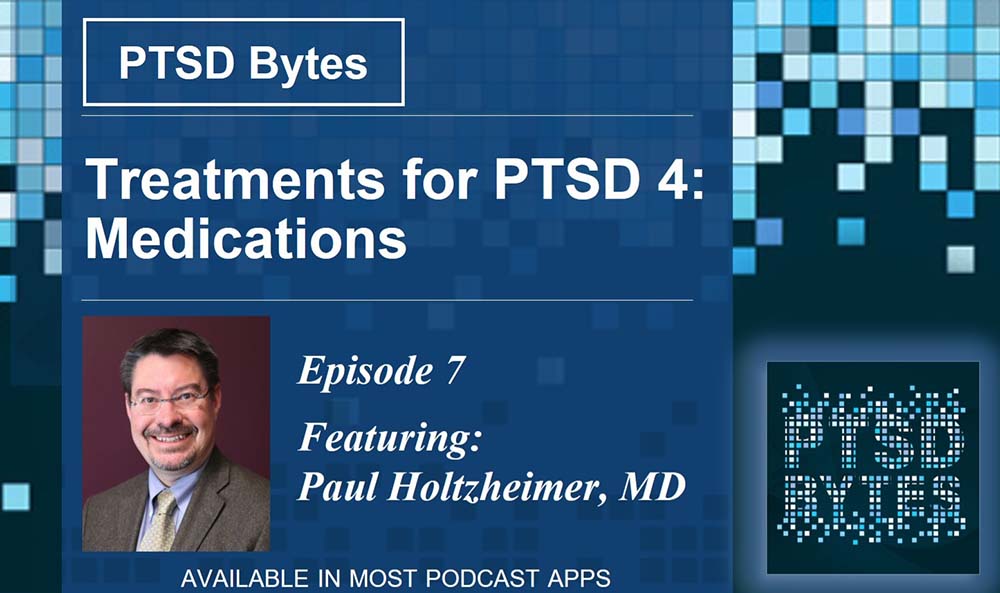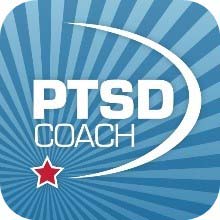In this episode of PTSD Bytes, host and clinical psychologist Pearl McGee-Vincent discusses medications as treatment for PTSD with Dr. Paul Holtzheimer, psychiatrist at VA’s National Center for PTSD.
Listen to “#7: Treatments for PTSD 4: Medications” on Spreaker.
Medications for PTSD
When chemicals in the brain are out of balance, it can lead to issues like PTSD or depression. Fortunately, medications can be used to correct the imbalance. The four medications recommended to treat PTSD are Zoloft, Paxil, Prozac and Effexor.
Research shows that these medications work for about half of the people who take them. PTSD medications are antidepressants. They should also help any depression symptoms. If one medication doesn’t work for you, a different one might. When the medications are working, you will experience improvements in most, if not all, of your symptoms.
This improvement usually starts within the first 4 to 12 weeks. It’s generally recommended that you continue taking it for at least another few months to experience the full effects. If your symptoms are better after a few months and you want to stop taking the medication, talk to your doctor.
Side effects
The side effects of PTSD medications are very well known. They are usually mild and go away in a few weeks. If side effects persist or become too much, your doctor might adjust the dose of your prescription or talk with you about trying a different medication.
Evidence-based psychotherapy
Holtzheimer says trauma-focused psychotherapies, such as Prolonged Exposure or Cognitive Processing therapy, are the best treatments for PTSD. If possible, it is recommended you try one of these talk therapies first. If it doesn’t work for you, or it isn’t an option for you at this time, talk to your health care provider to see if taking medication is possible.
Making the decision to start medication
When you’re deciding whether to start medication for PTSD, it’s important to talk to your psychiatrist or doctor about:
- What the different medications do.
- How they work.
- What the side effects are.
You should consider what preferences you have for your treatment. The PTSD Treatment Decision Aid, developed by the National Center for PTSD, is a useful tool. It goes over much of this information. You can use it on your own or together with your therapist or doctor.
Mobile apps like PTSD Coach and Insomnia Coach can also be helpful. PTSD Coach has information about PTSD treatments, as well as tools for tracking symptoms, practicing skills, and more.
If you experience sleep difficulties even with medication, Insomnia Coach can help you learn how to fall asleep faster and stay asleep.
Additional links:
- Videos of Veterans talking about their experience with PTSD medications.
- PTSD Coach app video.
- Introduction to the Insomnia Coach app video.
- More PTSD Bytes episodes.
If you are a Veteran who is experiencing a crisis or supporting a loved one who is, call 1-800-273-8255 and press 1 for immediate assistance, or chat online at VeteransCrisisLine.net/chat.
Topics in this story
More Stories
The Medical Foster Home program offers Veterans an alternative to nursing homes.
Watch the Under Secretary for Health and a panel of experts discuss VA Health Connect tele-emergency care.
The 2024 National Veteran Suicide Prevention Annual Report provides the foundation for VA’s suicide prevention programs and initiatives.









Yes prazosin for ptsd saved my life as well as others who tried to force me to talk about my war experience at the va. The va needs tomtake a more gentle approach to ptsd . For how i was treated there initially was not not what i expected. So say i lied, asked if i ever tried to kill myself in front of my older son was not safe approach. I almost lost it and was shaking violently and had to leave before i went postal. Only a few times in my life i had not acted out based on the event. For during war you either act or die from the event. You do not have time to think.
At 77+ years old now and left untreated until just about 2 years ago since 1963- 1967 and having flashbacks/little movies playing my head all those years since I’d say curing me now is impossible. All those flashbacks and stressors are far too deeply seated in my brain and daily life. I have had CPT about a year and a half ago or 2, take Paroxetine,,Xanax for over 40 years, high b/p meds twice a day, 2 different prostrate meds. and so on already. The last thing I want is another pill. I see a PTSD counselor about once a month and a peer support specialist about once a month also. PTSD has really made a mess of my life, no doubt about it. Far too many mistakes and things tied directly to PTSD in the past 58 years or so.